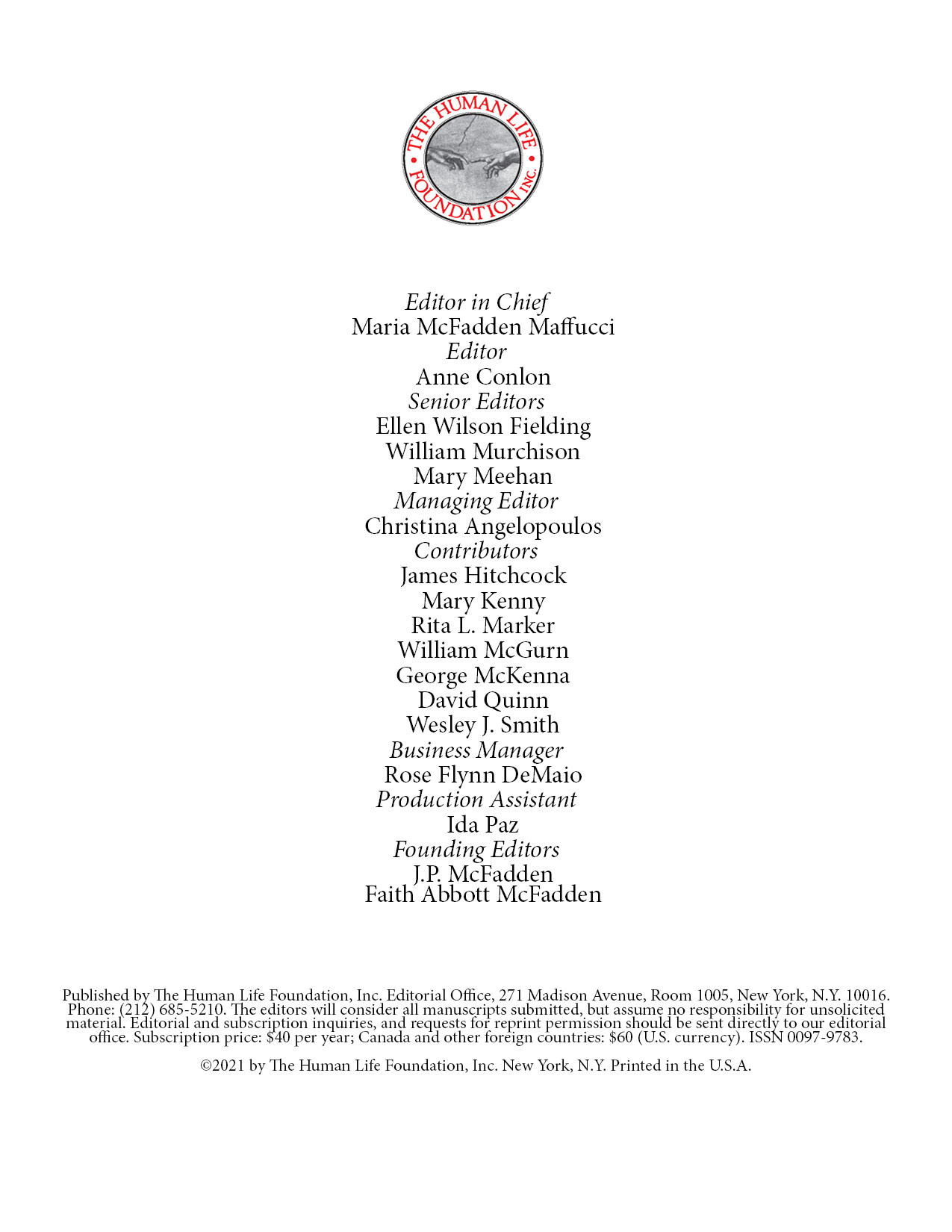|
|
 -
About this issue . . .
. . . Years ago, my dear friend and former boss, the late Father Richard John Neuhaus, founding editor of First Things, admitted to being jealous that our Review had scored another brilliant article from one of his most esteemed thinkers, Professor George McKenna. A regular contributor since 1996, Mckenna has done it again—but this time I think he’s even outdone himself! His new essay “The Odd Couple: Freedom and Liberty,” is so marvelous we added extra pages to this issue so we could publish it right away.
McKenna’s spot-on analysis of what our culture values—liberty—versus what it ought to strive for—freedom—is key to understanding how far we have strayed from the Judeo-Christian beliefs and ideals we used to take for granted, prime among them that a person’s true freedom lies in his or her ability to grow in virtue.
This is also an important theme in The Rights of Women: Reclaiming a Lost Vision, a new book by Erika Bachiochi, reviewed here by senior editor William Murchison. Bachiochi looks back to an early British feminist, Mary Wollstonecraft, whose persuasive case for equal educational and civil rights for women was made so that women would have equal opportunities to seek virtue alongside men, a vision distorted by the current women’s movement that belittles women’s connection to fertility to the point that “liberty” to abort has become paramount.
We welcome a new contributor, Randall K. O’Bannon, Director for Education and Research at the National Right to Life Educational Trust Fund, with his article, “Closed Clinics and ‘Reduced Access’ Save Lives.” As of this writing, the Texas Heartbeat Act is saving lives daily—but will it hold? You can read my thoughts on the matter in Appendix A, Edward Short’s profile of the Review, “Listening to the Heartbeat of the Pro-Life Movement,” from The Catholic World Report; thanks to editor Carl E. Olson for reprint permission. Thanks as well to Edward Mechmann for allowing us to reprint “The Texas Abortion Law Reaches the Supreme Court” from his public policy blog “Stepping Out of the Boat” in Appendix B. And our thanks to Plough Quarterly for permission to reprint Ross Douthat’s wonderful essay “The Case for One More Child: Why Large Families Will save Humanity.” Douthat’s newest book, The Deep Places: A Memoir of Illness and Discovery has just been released (October 26) by Penguin Random House. As you will see on p. 48, we have lost a great friend and defender of the unborn, Father Kazimierz A. Kowalski, who died unexpectedly on October 4, three days before our annual dinner, where we expected to see him again in person. Though we mourn his loss, we rest in the faith that his life of virtue is rewarded in eternity.
Finally, we are always grateful for Nick Downes’ cartons, and especially for those he has created—and updated—for us: See the final page of the issue, and thank you for your support of our efforts.
Maria McFadden Maffucci
Editor in Chief
-
“It’s a bracing essay,” I told George McKenna after our longtime contributor surprised us with “The Odd Couple: Liberty and Freedom” just as we were pulling this issue together. “Given the road you travel, from Aristotle to Ahmari and French, 8600 words, though more than we usually publish, is brilliant economy.” In a sweeping historical overview, McKenna distinguishes between “liberty” and “freedom,” terms that “are often used interchangeably” even though they “point to very different kinds of behavior, ‘liberty’ referring to morally indifferent choices and ‘freedom’ underscoring the moral significance of one choice over another.” While 21st-century “liberty conservatives” (like David French) insist government practice “viewpoint neutrality” when, for instance, public libraries host Drag Queen Story Hours, McKenna reminds us that “Aristotle’s ethical and political writings never shrank from offering what we call value judgments,” and that “historically, in the West at least,” moral lessons taught in church, but also in the home and school, “were deeply informed by Judeo-Christianity.” Twenty-first-century “freedom conservatives” (like Sohrab Ahmari) believe these drag queen events unsuitable for children—though not for gay bars—and insist, as McKenna puts it, “that on some issues government can—and should—play an activist role in promoting virtue and fighting immorality.” Today, as lockstep leftists—the “enemies of freedom”—occupy establishment pulpits and bully the public, McKenna poses a hard question: “While fighting them do we also need to fight some of our friends?” (Friends like David French.)
Read Full Intro
|
